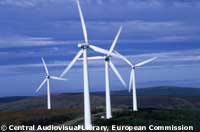Universities could cut energy usage by 40 per cent, finds EU project
Universities could cut their energy usage by 40 per cent, a study funded under the COPERNICUS subsection of the Fifth Framework's International cooperation programme has concluded. The project, which involved 28 universities from nine European countries as well as Israel was launched in 2000 by BEO (Biologie, Energie, Ökologie) of the Jülich Research Centre in Germany. The study comes to the conclusion that universities in Europe are important key players in the promotion of energy efficiency. They could save energy costs of around one hundred million euro per year if they carried out energy saving measures, the project found. The study also estimates a saving potential of around 40 per cent, based on more than 40 case studies that have shown annual savings up to 1.4 million euro per institution. In addition, universities with about 17 million students in Europe must be perceived as eminent social multipliers in efforts to promote energy use compatible with sustainable development, claim the project participants. This applies in particular to two fields in which universities in Europe could contribute most: the promotion of energy efficiency and environmentally friendly electric and electronic equipment (EEE) as well as the utilisation of renewable energies.

